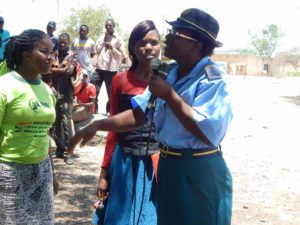Gender Based Violence(GBV) & Peace
 Girls and young, as well as women are often at the receiving end of violence. According to the Zimbabwe Demographic Health Survey of 2015, 33% of young women and girls experience sexual violence, child marriages as well as physical violence. Some of the young women are exposed to sex work because of circumstances where they further experience sexual and physical violence. During elections, young women and women are often at the receiving end of violence as well. TaLI has been working in communities to address Gender Norms built from negative religious and cultural practices that expose girls and young women to the dangers of abuse. TaLI has been working engaging boys, men, women and local leaders to address GBV and inequalities against girls and young women in every level of their lives beginning with families, community and national.
Girls and young, as well as women are often at the receiving end of violence. According to the Zimbabwe Demographic Health Survey of 2015, 33% of young women and girls experience sexual violence, child marriages as well as physical violence. Some of the young women are exposed to sex work because of circumstances where they further experience sexual and physical violence. During elections, young women and women are often at the receiving end of violence as well. TaLI has been working in communities to address Gender Norms built from negative religious and cultural practices that expose girls and young women to the dangers of abuse. TaLI has been working engaging boys, men, women and local leaders to address GBV and inequalities against girls and young women in every level of their lives beginning with families, community and national.
To-date TaLI has trained more than 1 000 women and men ages 25 to 55 as Community Peer Educators (CPEs) to work in communities to raise awareness of such issues as sexual violence, child marriages, physical violence, rape and equipping these volunteers to link victims with services such as health, justice and family reintegration with the support of government departments such as the Department of Social Services, Ministry of Women Affairs and the Police. This work has largely been carried out in Midlands Province (Zvishavane, Gweru, Kwekwe and Shurugwi), Harare Province, Mashonaland East and Mashonaland West Provinces.
With the support of local and international donors and partners, TaLI also engages youths and local communities in peace building especially against women before, during and after elections. Violence has been one instrument used to chase women and girls from participating in public life. Working with young men, communities and local leaders, TaLI has been carrying out community dialogues for youths and communities to resit violence but rather to engage with aspiring or current political leaders holding them accountable to provide solutions to their problems. TaLI continues to carry out this work in including using mainline and social media to spread information and advocate for peace. In the past television, radios, newspapers and social media such as Facebook and Twitter have been used to address these issues. Advocacy efforts have been undertaken by the organisation and in partnership with others to address policies and laws that protect girls and women from violence in public and private spaces. Position papers have been issue to parliament on such issues.
